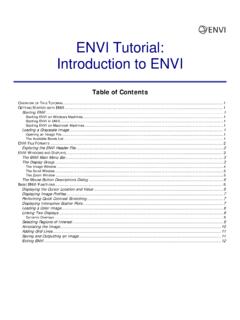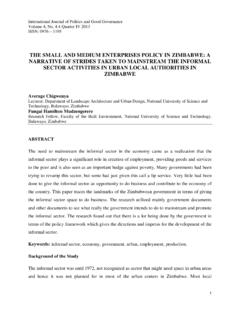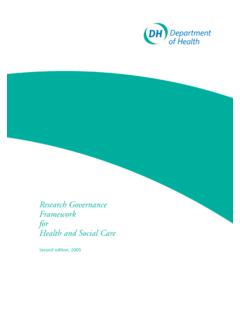Transcription of Stewardship Theory or Agency Theory: CEO Governance and ...
1 Stewardship Theory or Agency Theory : 3. CEO Governance and Shareholder Returns by Lex Donaldson . James H. Davis . Abstract: Agency Theory argues that shareholder interests require protection by separation of incumbency of ro les of board chair and CEO. Stewardship Theory argues shareholder interests are maximised by shared incumbency of these ro les. Results of an empirical test fail to support Agency Theory and provide some support for Stewardship Theory . Keywords: Stewardship Theory ; Agency Theory ; CEO; CHAIR OF BOARD;. SHAREHOLDER RETURNS; RETURN ON EQUITY. Australian Graduate School of Management, University of New South Wales, PO Box 1, Kensington NSW 2033. Formerly Department of Management and Organization, College of Business Administration, University of Iowa; Presently Department of Management, College of Business Administration, University of Notre Dame, Notre Dame, Indiana 46556, We should like to thank the following for their encouragement to our project of critically inquiring into the validity of the Agency Theory of management: Professors Chris Argyris, Alfred Chandler, Amitai Etzioni, Jerald Hage, Don McCloskey, Mancur Olson, Charles Perrow, Robert Tricker and David Whetten.
2 The project is continuing. Australian Journal of Management, 16, 1, June 1991, The University of New South Wales - 49 - AUSTRALIAN JOURNAL OF MANAGEMENT June 1991. 1. Introduction R ecent thinking about strategic management and business policy has been influenced by Agency Theory . This holds that managers will not act to maximise the returns to shareholders unless appropriate Governance structures are implemented in the large corporation to safeguard the interests of shareholders (Jensen and Meckling 1976). The board of directors has an important function here and in particular the relationship between the chairperson and the chief executive officer is key (Tricker 1984). Shareholder interests will be safeguarded only where the chair of the board is not held by the CEO or where the CEO has the same interests as the shareholders through an appropriately designed incentive compensation plan (Williamson 1985).
3 Such a view, however, runs counter to other thinking about strategic management which holds that a more critical factor for shareholder returns is a correctly designed organisation structure which allows the CEO to take effective action. The present paper seeks to contrast these two views about the Governance and incentive of the CEO and subject them to empirical tests. The discussion herein cautions against too ready acceptance of the Agency Theory model of CEO ro le and rewards. And the paper introduces the alternate approach to corporate Governance of Stewardship Theory . 2. Theory A gency Theory argues that in the modern corporation, in which share ownership is widely held, managerial actions depart from those required to maximise shareholder returns (Berle and Means 1932; Pratt and Zeckhauser 1985). In Agency Theory terms, the owners are principals and the managers are agents and there is an Agency loss which is the extent to which returns to the residual claimants, the owners, fall below what they would be if the principals, the owners, exercised direct control of the corporation (Jensen and Meckling 1976).
4 Agency Theory specifies mechanisms which reduce Agency loss (Eisenhardt 1989). These include incentive schemes for managers which reward them financially for maximising shareholder interests. Such schemes typically include plans whereby senior executives obtain shares, perhaps at a reduced price, thus aligning financial interests of executives with those of shareholders (Jensen and Meckling 1976). Other similar schemes tie executive compensation and levels of benefits to shareholders returns and have part of executive compensation deferred to the future to reward long-run value maximisation of the corporation and deter short-run executive action which harms corporate value. In like terms, the kindred Theory of organisational economics is concerned to forestall managerial opportunistic behaviour which includes shirking and indulging in excessive perquisites at the expense of shareholder interests (Williamson 1985).
5 A major structural mechanism to curtail such managerial opportunism is the board of directors. This body provides a monitoring of managerial actions on behalf of shareholders. Such impartial review will occur more fully where the chairperson of the board is independent of executive management. Where the chief executive officer is chair of the board of directors, - 50 - , Donaldson & Davis: Stewardship Theory . the impartiality of the board is compromised. Agency and organisational economics theories predict that when the CEO also holds the dual ro le of chair, then the interests of the owners will be sacrificed to a degree in favour of management, that is, there will be managerial opportunism and Agency loss. The model of man underlying Agency and organisational economics is that of the self-interested actor rationally maximising their own personal economic gain.
6 The model is individualistic and is predicated upon the notion of an in-built conflict of interest between owner and manager. Moreover, the model is one of an individual calculating likely costs and benefits, and thus seeking to attain rewards and avoid punishment, especially financial ones. This is a model of the type called Theory X by organisational psychologists (McGregor 1960). There are, however, other models of man which originate in organisational psychology and organisational sociology. Here organisational ro le-holders are conceived as being motivated by a need to achieve, to gain intrinsic satisfaction through successfully performing inherently challenging work, to exercise responsibility and authority, and thereby to gain recognition from peers and bosses (McClelland 1961; Herzberg et al. 1959). Thus, there are non-financial motivators.
7 Moreover, identification by managers with the corporation, especially likely if they have served there with long tenure and have shaped its form and directions, promotes a merging of individual ego and the corporation, thus melding individual self-esteem with corporate prestige. Again, even where a manager may calculate that a course of action is unrewarding personally they may nevertheless carry it out from a sense of duty, that is, normatively induced compliance (Etzioni 1975). Further, while Agency theorists posit a clear separation of interests between managers and owners at the objective level (Jensen and Meckling 1976), this may be debatable, and organisational sociologists would point out that what motivates individual calculative action by managers is their personal perception (Silverman 1970). To the degree that an executive feels their future fortunes are bound to their current corporate employers through an expectation of future employment or pension rights, then the individual executive may perceive their interest as aligned with that of the corporation and its owners, even in the absence of any shareholding by that executive.
8 These theoretical considerations argue a view of managerial motivation alternative to Agency Theory and which may be termed Stewardship Theory (Donaldson 1990a, 1990b; Barney 1990). The executive manager, under this Theory , far from being an opportunistic shirker, essentially wants to do a good job, to be a good steward of the corporate assets. Thus, Stewardship Theory holds that there is no inherent, general problem of executive motivation. Given the absence of an inner motivational problem among executives, there is the question of how far executives can achieve the good corporate performance to which they aspire. Thus, Stewardship Theory holds that performance variations arise from whether the structural situation in which the executive is located facilitates effective action by the executive. The issue becomes whether or not the organisation structure helps the executive to formulate and implement plans for high corporate performance (Donaldson 1985).
9 Structures will be facilitative of this goal to the extent that they - 51 - AUSTRALIAN JOURNAL OF MANAGEMENT June 1991. provide clear, consistent ro le expectations and authorise and empower senior management. Specifically, as regards the ro le of the CEO, structures will assist them to attain superior performance by their corporations to the extent that the CEO. exercises complete authority over the corporation and that their ro le is unambiguous and unchallenged. This situation is attained more readily where the CEO is also chair of the board. Power and authority are concentrated in one person. There is no room for doubt as to who has authority or responsibility over a particular matter. Similarly, the expectations about corporate leadership will be clearer and more consistent both for subordinate managers and for other members of the corporate board.
10 The organisation will enjoy the classic benefits of unity of direction and of strong command and control. Thus, Stewardship Theory focuses not on motivation of the CEO but rather facilitative, empowering structures, and holds that fusion of the incumbency of the ro les of chair and CEO will enhance effectiveness and produce, as a result, superior returns to shareholders than separation of the ro les of chair and CEO. In policy discussion to date, there has been some tendency to approach the issue of CEO duality from within a perspective akin to Agency Theory (Kesner and Dalton 1986). Commentators have noted that among large corporations, the majority have CEOs who are also the board chair (Kesner and Dalton 1986). The proportion is presently about eighty per cent (Dalton and Kesner 1987). There is some evidence that this proportion has risen over the years, and that the has an unusually high proportion of CEO duality, especially relative to the competitor nation of Japan (Kesner and Dalton 1986; Dalton and Kesner 1987).









